Love is a battlefield—or so the song goes—but frankly, so is running a small business. One of the best things you can get for yourself is useful business software. Widespread smartphones and computers have made life significantly easier for everyone, including those who own small businesses. But while you may be aware of the obvious solutions—such as things like digital calendars—you may not be aware of some of the other helpful small business software solutions out there. And that’s not your fault: there are an absolute ton of them, and sometimes it can be hard to tell which will be useful.
Before we go on, the first thing to look for isn’t software, it’s what small businesses actually need.
What are Small Business Needs?
We’re focusing on a lot of new digital tech tools in this post, but don’t get it twisted—the needs of small businesses have been the same since time immemorial. It doesn’t matter what year, decade, or century you are in, there are a few things you have to do in order to be successful, aside from finding the best small business software.
1. Organization
Being properly organized means checking a lot of boxes—from time management to getting your paperwork where it needs to be to scheduling your employees correctly—but those boxes have got to be checked if you are going to have success when running your small business. And don’t you fret- we have plenty of suggestions for you on that front below.
2. Customer satisfaction
Likewise, garnering customer satisfaction has also always been key, whether it’s the Middle Ages and you’re hawking your wares or you’re trying to make posts on Facebook. If it’s 1206 AD and you’re trying to get people in town to buy your soup but they’ve heard bad things, they aren’t going to eat. It’s the same nowadays- which means controlling the narrative and getting your POV out there is key to being able to make it. The best defense is a good offense, after all-and so it goes for the armor which can provide protection for your small business.
3. Promotion
Self-promotion means getting your name out there, but having good feelings attached to that name is critical. As a small business, you will need to worry about promotion, not just marketing and PR. Promotion is also all the little things that make up the image of your business, even before a customer makes direct contact with it. Things that give the impetus to either deal with your business or go to a competitor.
So what are some small business software programs that can help with organization, customer satisfaction, and promotion?
Best Business Software
MightyCall
MightyCall combines both organizational and customer service help into one. As a virtual phone system, MightyCall users can pick from two different plans: Business and Enterprise. Both plans come with at least two digital phone numbers, lite CRM (customer relationship management, for those not in the know) functionality, texting, auto attendants, and the ability to design your own call flow (which sends customers to where they need to go, be it either pre-recorded answers to the most common questions, a member of your sales team, or elsewhere).
There are a ton of other features, each giving you serious help in either helping your customers (including things like office hours and VIP caller options) or organizing your team. With the web panel, a central hub, you can leave messages for one another, edit your journal, and see all of the activity that has been going on. It’s one of the fully customizable best business softwares to run your business.
It’s also made for those who are on the go, with a highly functional mobile app and desktop-accessible webphone and softphones, meaning you can make calls from any internet-connected device, including tablets, phones (through which you can call over the app or over the phone itself), and computers.
Freshbooks
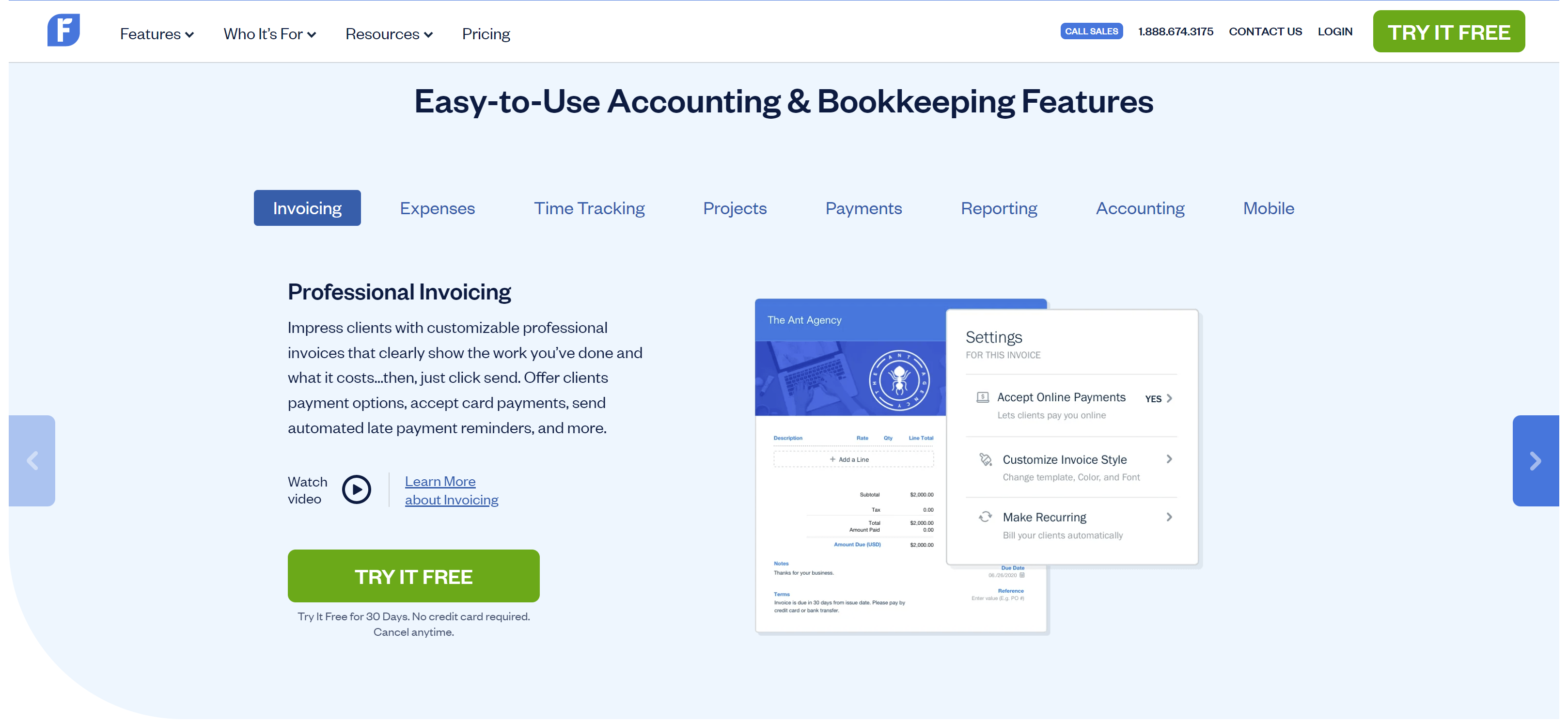
Screenshot via Freshbooks
Freshbooks helps you out with one of the things you will most want to have organized when running a small business: your bills and your money. It’s made for smaller companies who need help with invoicing, organizing your receipts and expenses, and want quicker ways of getting paid (and who doesn’t want to get paid quickly?). For smaller businesses which are a little bit larger and need to be concerned with things like this, they also have inventory tracking and provide for a space for your team to organize itself and dish out work more effectively.
The negatives for Freshbooks are relatively few. Their mobile app doesn’t do everything that their main site does; this admittedly can cause some difficulty if you’re on the go. The invoice options—though beautifully designed—can’t be customized all that much.
It’s also pretty inexpensive (which makes sense, as it’s targeted toward businesses on the smaller side of things). They have three price tiers: Lite ($4.50 a month), Plus ($7.50 a month), and Premium ($15.00). Nothing bank-breaking. They also have an option titled Select, for those who only want specific options (which means the price is calculated after you pick the features you’d like).
Xero
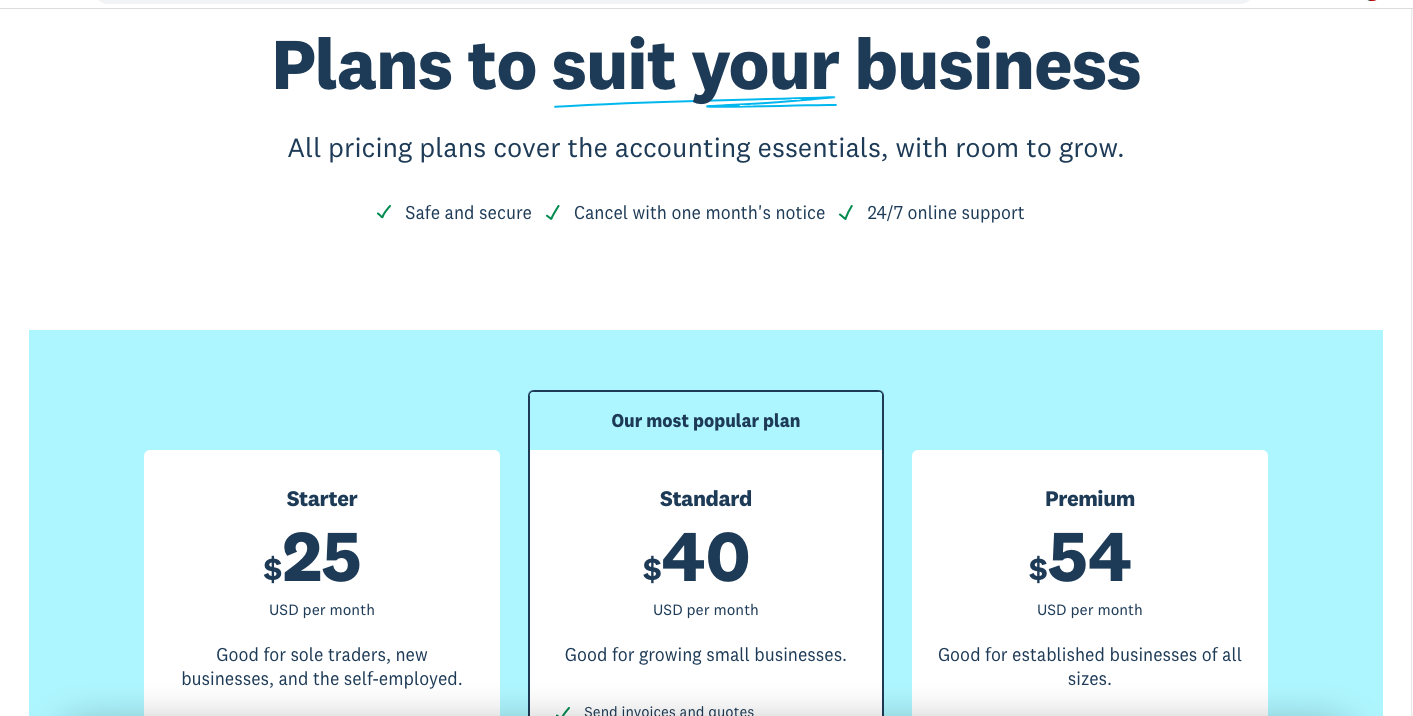
Screenshot via Xero
When it comes to managing your small business finances, efficiency and reliability are crucial. Xero, a cloud-based accounting software, offers a comprehensive solution tailored specifically for small business owners. With an intuitive interface and competitive pricing, Xero ensures your finances are in order, so you can focus on what matters most—growing your business.
Xero offers an extensive range of features designed to simplify your accounting, including seamless invoicing, easy expense tracking, and robust inventory management. Xero’s user-friendly dashboard gives you an instant overview of your financial health, while customizable reports allow you to dive deeper into your data when needed.
One of the standout features of Xero is its robust integration capabilities, making it easy to connect with over 800 popular business apps. From e-commerce platforms like Shopify to time tracking tools like TSheets, Xero’s seamless integrations enable you to streamline your workflow and manage all aspects of your business in one place.
Xero offers three flexible pricing plans to suit businesses of all sizes: Starter ($25 a month), Standard ($40 a month), and Premium ($54 a month). All plans come with a 30-day free trial, so you can explore Xero’s features and decide if it’s the right fit for your business.
Findymail
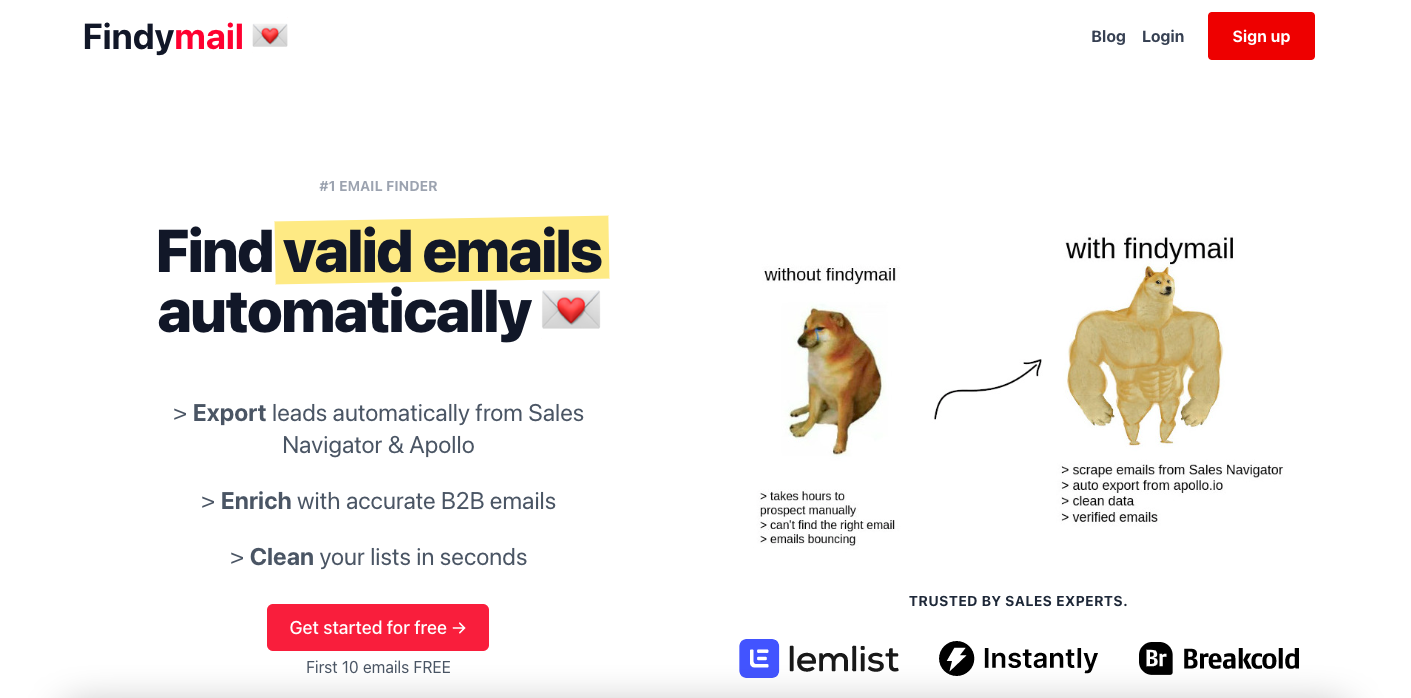
Screenshot via Findymail
In the modern business landscape, effective communication is crucial, and connecting with the right people can propel your business forward. Findymail, an innovative email finder software, offers a powerful solution for discovering professional email addresses with precision and ease. With a user-friendly interface and competitive pricing, Findymail empowers you to build lasting connections and drive business growth.
Findymail excels at simplifying the process of finding email addresses. By utilizing advanced search algorithms and data aggregation techniques, Findymail provides accurate results, even when minimal information is available. The software is perfect for sales, marketing, and networking efforts, ensuring you reach the right contacts every time.
They also offer sales pipeline management (helping you organize your sales process from start to finish), reporting and analytics (if you don’t think statistics are important to organization, think again), and email marketing (a big part of getting your name out there and controlling the narrative!). For efficient email marketing, you can integrate the third-party tool Findymail with their platform, which can help you find and verify the email addresses of your target audience.
Findymail offers flexible pricing plans to accommodate businesses of all sizes: Basic ($49 a month), Standard ($99 a month), and Premium ($249 a month). Test the waters with first 10 free emails to experience Findymail’s capabilities firsthand.
ClickFunnels
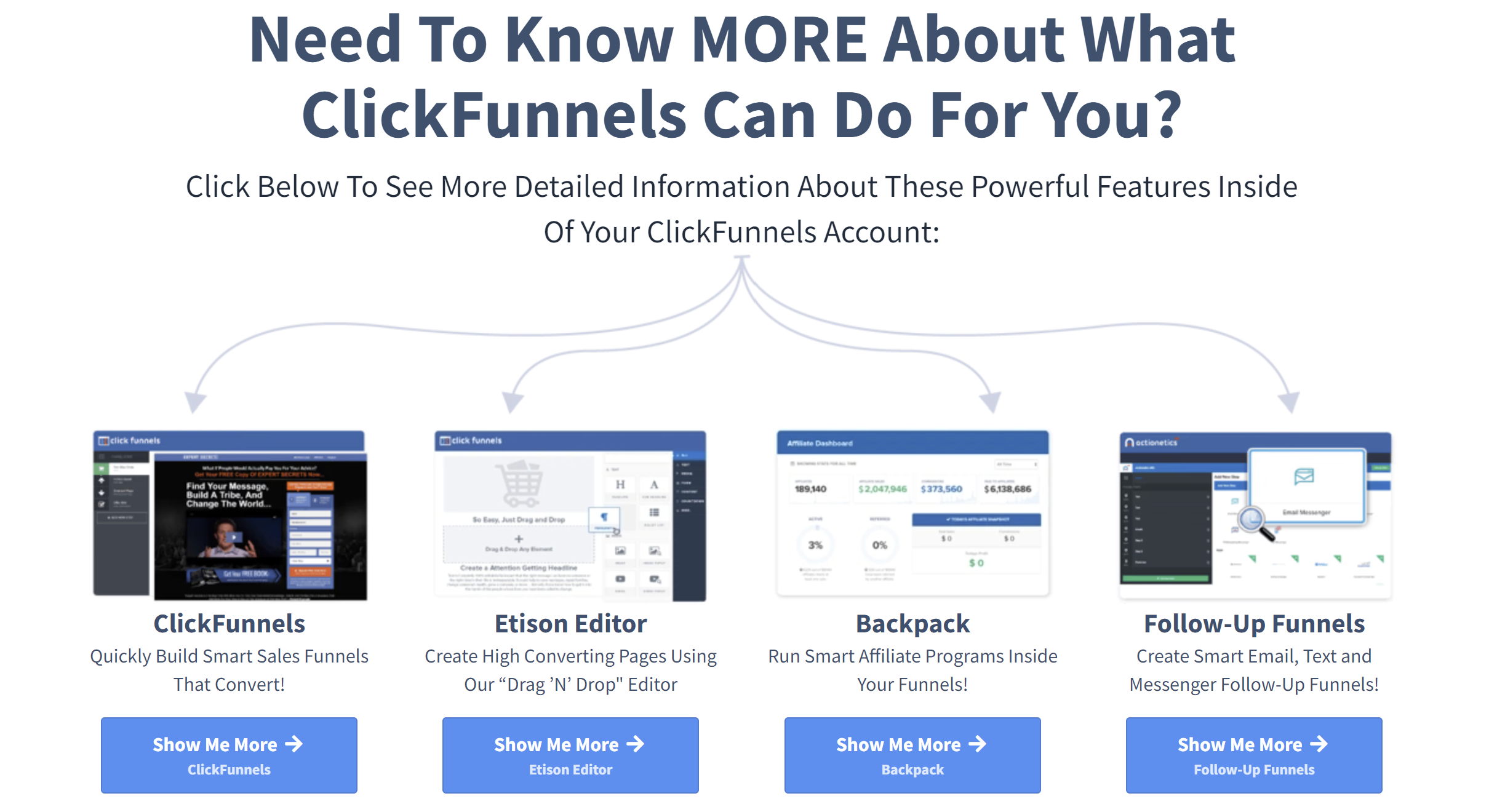
Screenshot via ClickFunnels
Whereas our last option was more focused on organization, ClickFunnels is more focused on name recognition and customer satisfaction. The idea of ClickFunnels is to help small businesses direct (or “funnel”) customers to the place they should be. ClickFunnels provides you (the small business owner) with a bunch of templates you can select from. These templates are effectively packaged website pages which are laid out in a way that is most optimal for you, and they’re all customizable.
The traditional model goes something like this: you have them start on the main page, and offer them selections (like say, some price tiers). Maybe you direct them to one particular price tier, but that one isn’t their style- they want something with more features, for example. The “funnel” would give them the option for something like that (perhaps to direct them to a higher price plan). If you want them to buy products, you can edit the template to throw a sales option into the page (so that they can purchase your product right there without needing to go to another page). Basically, it gives you the option to make an easily customizable website that requires no IT guys or outside help. It also helps you contact customers through social media, through emails, texts, and other methods.
One of the negatives, however, is that it’s not the cheapest. It costs around $100 a month for one of their plans, and just less than three hundred dollars a month if you want nine website domain names and unlimited funnels (the plans are “Starter” and “Platinum,” respectively). If you want to go with them, you’ll probably end up loving it- but you’ll have to build your business around using it, and it won’t come cheap.
Google Workspace
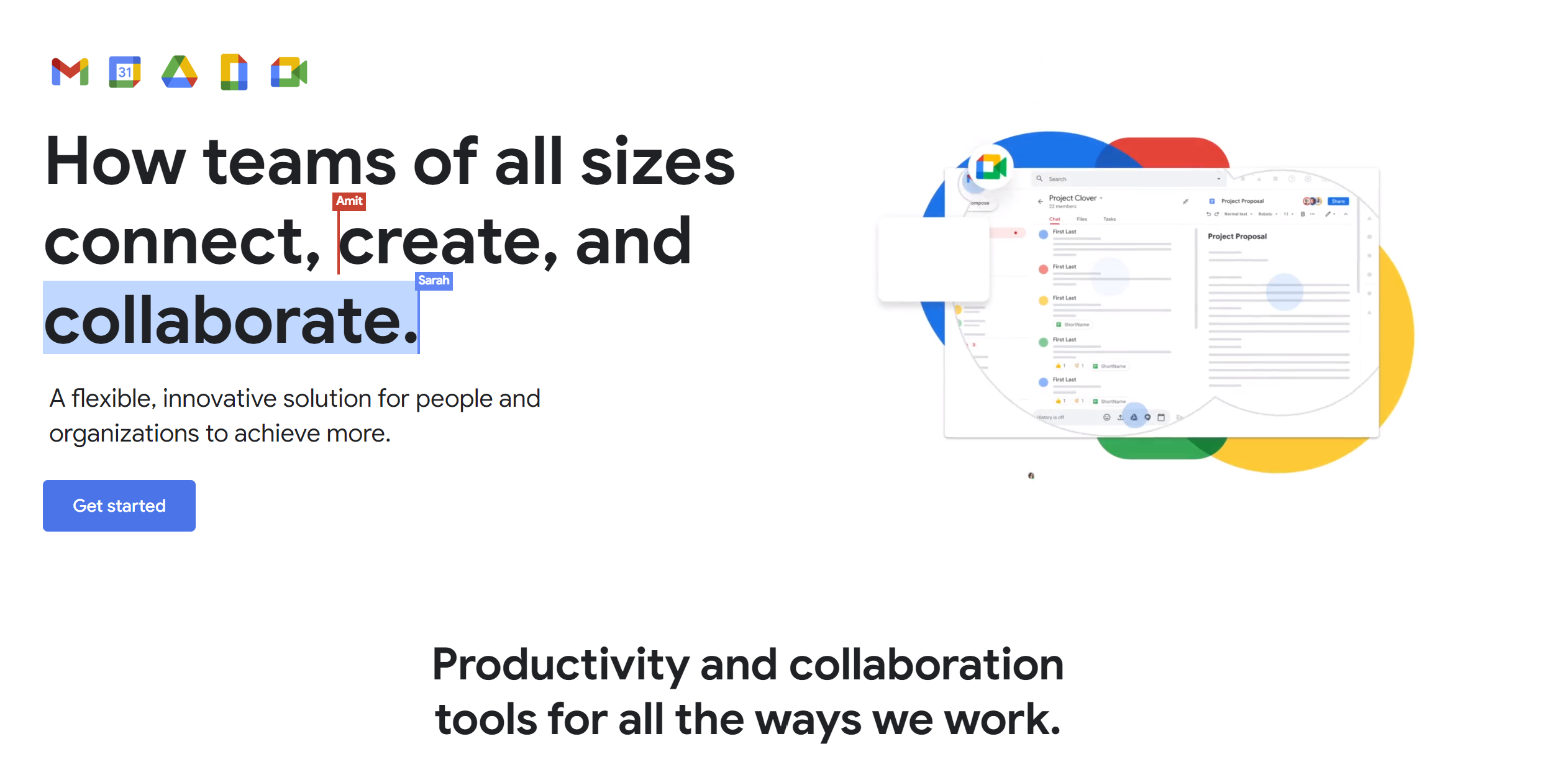
Screenshot via Google Workspace
If you think you haven’t heard of Google Workspace, you might know it by its former name: G-Suite. Google Workspace is basically a platform that helps your team organize itself in a way that is most conducive to your business. It’s designed to be flexible, so it can be used for small businesses (they even have options for if you’re the only one in your own employ!) up to having over 300 people working with you.
Workspace allows you to combine Google business software applications with one another. So while you probably have a Gmail account, you likely haven’t been able to realize its full potential. With Workspace, you can- and you get access to the full range of other Google programs, like Forms, Sites, Currents, Keep, and tons more. Plus Workspace fully integrates all of them, so it’s not clunky and doesn’t make you do the work when trying to cross-use different programs.
It’s got three plans, ranging from $6 a month to $18 a month- so nothing that will set you back significantly. The different plans offer varying amounts of cloud storage, differing caps on participants for video meetings, and different levels of security and management controls.
The downsides vary depending on the kind of business you want to run; mainly, it’s that you’ll be totally reliant on Google, a gigantic company which probably won’t have a ton of time for your specific needs and can change its mind on a whim (and frequently does).
Keap

Screenshot via Keap
Keap is nominally a CRM company, but it goes beyond that by also offering automated sales and marketing. Like MightyCall, it’s focused on putting a premium on customization. Like other CRM platforms, it also can be integrated into common tools which your business will end up using, including being able to create invoices and managing appointments (there are over 230 integrations, so you’ll probably have all of your bases covered).
They also offer sales pipeline management (helping you to organize your sales process from start to finish), reporting and analytics (if you don’t think statistics are important to organization, think again), and email marketing (a big part of getting your name out there and controlling the narrative!).
Pricing depends on how many contacts you have, but there are effectively three different plans- Lite, Pro, and Max, ranging from $56 a month to $140 a month. For the number of features they have, it’s pretty useful.
Choosing the Best Software for Business
Ultimately, you should come up with your own perfect set of business software and programs that cover the needs of your company. It will take some time to adjust and try them, but in the end, you will have a smoothly working, optimized system. This article is just the first step in finding the perfect software for business.





























